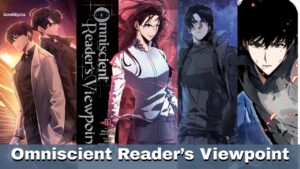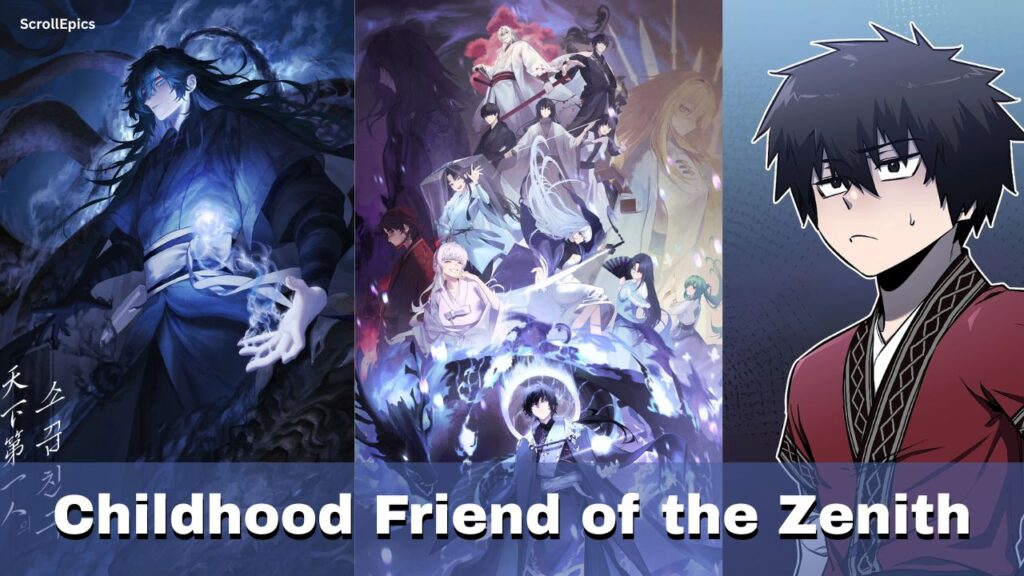
At first glance, Omniscient Reader’s Viewpoint looks like another survival-action web novel—apocalyptic world, mythic powers, a lone protagonist trying to save what’s left of humanity. And in a way, it is.
But it’s also something stranger, slower, and far more introspective.
This isn’t a story about one man changing the world—it’s about what happens when a lifelong reader is forced to live inside the very fiction he once escaped into. It’s about the blurry lines between reader, writer, and character. And more than anything, it’s a meditation on stories themselves: the ones we consume, the ones we carry, and the ones we become.
Where to Read Omniscient Reader’s Viewpoint Online
If you’re eager to dive into the world of Omniscient Reader’s Viewpoint (ORV), there are several platforms where you can explore both the webtoon adaptation and the original novel. Here’s a guide to help you find the version that suits your reading preferences:
1. Webtoon Adaptation (Manhwa) – Official English Release
For a visually engaging experience, the webtoon adaptation of ORV is available on Webtoon. This platform offers the series in English, with new episodes released weekly. The webtoon brings the story to life with dynamic artwork and is accessible for free, though some of the latest chapters may require coins to unlock.
2. Official English Novel – Print and Digital Editions
The original web novel of ORV is being officially translated into English by Ize Press, an imprint of Yen Press. The first volume is scheduled for release on July 22, 2025, and will be available in both paperback and digital formats. You can pre-order or purchase the novel through various retailers, including Yen Press and Amazon
3. Archive Access – Unofficial English Translation
For those interested in exploring the novel ahead of the official English release, an unofficial English translation is available on Internet Archive. This version provides access to the complete story, though it’s important to note that it hasn’t undergone official editing or quality assurance.
What Omniscient Reader’s Viewpoint Is Really About?
At its heart, Omniscient Reader’s Viewpoint is a story about stories—and what happens when someone who’s always lived on the outside of fiction is suddenly pulled into the middle of it.
The novel begins with Kim Dokja, an ordinary salaryman who’s spent years obsessively reading a niche web novel called Three Ways to Survive the Apocalypse. One day, that story becomes reality. Monsters appear, gods descend, and the world falls apart—following the exact path of the novel only Kim Dokja has read to the end.
But this isn’t a simple “reader becomes protagonist” story. What unfolds is far more layered: a meditation on fate, authorship, and identity. Kim Dokja isn’t the “main character”—that title belongs to Yoo Joonghyuk, the unkillable hero of the original novel. Dokja’s role is something different. He becomes a reader trying to guide a story not meant for him, walking the line between passive observer and active participant.
The novel plays with this duality constantly. Every arc challenges the idea of who gets to shape the narrative and what it means to exist within one. Omniscient Reader’s Viewpoint isn’t just about survival in an apocalyptic world—it’s about reclaiming agency, forming bonds, and discovering your own story in the spaces between someone else’s words.
It’s strange. It’s meta. And it works—because the emotions behind it are painfully real.
A Story Told Through Tragedy—and Connection
While Omniscient Reader’s Viewpoint is full of action, gods, and world-ending scenarios, it’s the emotional threads that keep the story grounded. This is a novel about people—flawed, wounded, brilliant people—who find themselves caught in something far larger than they can understand, and still choose to fight.
Kim Dokja’s journey is paved with sacrifice. He lies, he hides things, he pushes others away—but he also protects, unites, and quietly bears the weight of everyone’s survival. And along the way, his relationships—particularly with Yoo Joonghyuk, Han Sooyoung, and the rest of “Kim Dokja’s Company”—become the emotional core of the narrative.
These bonds aren’t built through typical power-up arcs or romantic entanglements. They’re formed through shared pain, grudging trust, and moments of deeply human vulnerability. The result is a story that isn’t just about saving the world, but about trying to matter in it—together.
A World of Contradictions
ORV’s setting is chaotic: constellations acting as gods, narrative-driven powers, and a world that constantly reshapes itself based on the rules of fiction. But beneath the complexity lies a surprisingly consistent logic—one where stories are currency, identity is fluid, and reality bends to those who can tell the best tale.
Yet the world isn’t just clever—it’s contradictory. The plot loops in on itself, the characters often play multiple roles at once, and nothing is ever fully explained until much later (if at all). What looks like a plot hole might later reveal itself as foreshadowing. What feels like a cliché might turn out to be the key to understanding everything.
And in that chaos, ORV finds its voice. It doesn’t try to make everything neat or easy. It embraces the confusion, the emotion, the contradictions—and makes them part of the message. After all, in a world shaped by stories, the truth is always layered.
Why Omniscient Reader’s Viewpoint Stands Out
Omniscient Reader’s Viewpoint doesn’t follow the usual rules of web fiction. Where many stories chase power scaling or fanservice, ORV goes inward—examining the nature of storytelling itself while still delivering pulse-pounding action and deeply emotional character arcs.
It stands out because it dares to be layered. Beneath the battles and dramatic twists, there’s a quiet, persistent commentary about the role of readers, writers, and the fictions we cling to. Every mechanic in the story—from the constellation system to the idea of “fables”—feeds into that central question: who gets to write the story of your life?
It also refuses to flatten its characters. No one exists just to push the plot. Every named character, even those with limited screen time, has some personal journey. Review after review highlights how readers felt connected to everyone—not just the main cast, but the people they encountered along the way.
And then there’s the pacing of payoff. ORV doesn’t rush to impress. It builds slow. It misleads you. Then, when you least expect it, it hits you with a revelation or emotional climax that reframes everything. It’s a story that respects your patience—and rewards it tenfold.
Ultimately, what sets ORV apart is its trust in the reader. It assumes you’ll think. That you’ll feel. That you’ll want more than spectacle. And that’s why it lingers—long after the final chapter ends.
Omniscient Reader’s Viewpoint Main Character Kim Dokja – The Reader Who Became the Story
Kim Dokja isn’t your typical protagonist. He’s not the strongest, the bravest, or even the most honest. What he is, though, is deeply human—and that’s exactly what makes him unforgettable.
Unlike most action-driven main characters, Dokja isn’t trying to become a hero. He’s trying to survive. To protect. To control a story that was never meant to be his. He starts out as just a reader—someone on the outside looking in—and ends up as the emotional center of a world slowly collapsing under its own narrative weight.
What makes him compelling isn’t perfection, but contradiction. He manipulates others, hides information, and constantly downplays his own pain. But those same choices come from a place of quiet, self-destructive loyalty. He doesn’t want glory—he just doesn’t want the people he cares about to die.
And somehow, that makes his actions hit even harder. Every sacrifice, every plan, every moment of silent grief builds a character who is less a chosen one and more an accidental savior. He doesn’t fit the mold, and that’s what gives the story its shape.
Kim Dokja doesn’t ask to be the protagonist. But somewhere along the way, the story chooses him anyway.
Omniscient Reader’s Viewpoint Characters Guide
While Omniscient Reader’s Viewpoint revolves around Kim Dokja, its power lies in the ensemble. This is a story where no character feels like an accessory. Everyone has a voice, a journey, and a reason to be remembered.
Kim Dokja
The unlikely centerpiece of the narrative. A lifelong reader who becomes the sole person aware of how the story unfolds, Kim Dokja is calculating, self-sacrificing, and endlessly layered. He lies to others, lies to himself, and yet quietly carries the emotional weight of the entire story. His strength isn’t raw power—it’s how far he’s willing to go to protect the people he believes in, even when he’s convinced he doesn’t deserve them.
Yoo Joonghyuk
The “original” protagonist. In the novel-turned-reality that Kim Dokja read, Yoo Joonghyuk was the hero—stoic, invincible, endlessly reincarnated. But in ORV, he’s more than that. Cold on the surface but deeply principled, his evolving partnership with Kim Dokja becomes one of the most emotionally rich dynamics in the series. Their bond is complex: not quite friendship, not quite rivalry, but something that transcends definition.
Han Sooyoung
Sharp, irreverent, and endlessly clever, Han Sooyoung is a writer both in profession and personality. Her connection with Dokja is marked by sarcasm, loyalty, and fierce emotional undercurrents. She’s often the voice of reason—or chaos—and plays a vital role in keeping Dokja grounded, even when he tries to isolate himself.
Lee Jihye
Originally a side character in the novel, Jihye grows into a fully realized force of her own. Her loyalty to Yoo Joonghyuk and later the entire company reflects her growth from follower to leader. She’s hot-headed, brave, and never afraid to speak her mind.
Yoo Sangah
Calm, intellectual, and compassionate. Sangah represents quiet strength and kindness in a world that often rewards cruelty. Her empathy plays a vital role in keeping the group human, even when circumstances grow inhuman.
Jang Hayoung
A newer addition to the team, Hayoung brings unpredictability and fresh energy. His journey from suspicious outsider to trusted ally is one of many examples of how ORV lets its characters evolve through experience, not exposition.
Notable Constellations and Villains in Omniscient Reader’s Viewpoint
In the universe of Omniscient Reader’s Viewpoint (ORV), the narrative is enriched by a diverse array of Constellations and antagonists, each contributing uniquely to the story’s depth and complexity.
Prominent Constellations
Constellations in ORV are powerful entities that sponsor incarnations, influencing events from behind the scenes. Notable Constellations include:
-
Secretive Plotter: A mysterious figure whose true identity remains concealed, yet plays a pivotal role in guiding Kim Dokja.
-
Demon-like Judge of Fire (Uriel): An Archangel from the “Eden” nebula, known for her fiery judgment and unwavering support for Kim Dokja and his companions.
-
Abyssal Black Flame Dragon: Leader of the “Black Cloud” nebula, this formidable entity initially offers sponsorship to Kim Dokja and remains a significant presence throughout the narrative.
-
Prisoner of the Golden Headband (Sun Wukong): A legendary figure from the “Emperor” nebula, known for his strength and interest in Kim Dokja’s journey.
-
Queen of the Darkest Spring (Persephone) and Father of the Rich Night (Hades): Co-leaders of the “Underworld” nebula, both take a keen interest in the unfolding events and Kim Dokja’s role within them.
These Constellations, among others, add layers of intrigue and complexity to the story, each with their own motives and influence over the scenarios.
Formidable Antagonists
The narrative also features a range of antagonists, each presenting unique challenges:
-
Anna Croft: A prophet with her own agenda, often at odds with the protagonists.
-
Gong Pildu: Initially an antagonist known for his territorial control and confrontational nature.
-
Lee Seolhwa: A complex character whose actions and affiliations add tension to the storyline.
-
Reinheit von Djerba: A member of the “10 Evils,” a group of formidable adversaries within the narrative.
Is Omniscient Reader’s Viewpoint Worth Reading?
If you’ve ever wondered whether a web novel could change how you think about fiction itself, Omniscient Reader’s Viewpoint might be the one that does it.
It’s not flawless. Some arcs drag. The structure can feel overwhelming. And the metafictional angle might not be for everyone. But what ORV offers is rare: a story that isn’t just about characters fighting to survive—it’s about stories fighting to be told.
This novel blends action with emotional weight, philosophical themes with punchy humor, and existential dread with surprising warmth. It’s intense, but it never loses its humanity. Every arc pushes the characters—and the readers—into new emotional territory. It challenges the way we define roles like “hero,” “reader,” and “narrator.” And for those who invest in it, the payoffs are enormous.
More than anything, Omniscient Reader’s Viewpoint is a story that sticks. Even after 500+ chapters, readers come away changed—not because of one twist or ending, but because of how the novel reflects on storytelling itself.
So, is it worth reading? Yes. Especially if you want more than just a thrill ride. ORV is for readers who want to feel, think, and remember. It’s not just an apocalypse tale—it’s a meditation on why we read at all.
Omniscient Reader’s Viewpoint FAQ
What is Omniscient Reader’s Viewpoint about?
Omniscient Reader’s Viewpoint follows Kim Dokja, a regular office worker who becomes the only person aware that the world has turned into the plot of his favorite novel. With the knowledge of the story’s future, he navigates an apocalyptic reality filled with powerful beings, moral dilemmas, and layered relationships.
Is Omniscient Reader’s Viewpoint complete?
Yes. The Korean web novel is fully completed with 551 chapters, including the epilogue. Side stories and a webtoon adaptation are ongoing.
Where can I read Omniscient Reader’s Viewpoint?
The official English webtoon is available on Webtoon. The officially translated English novel is being released by Yen Press under Ize Press. Unofficial translations of the full novel exist online, though they vary in quality.
How long is Omniscient Reader’s Viewpoint?
The main novel consists of 551 chapters. Depending on your pace, it can take anywhere from a couple of weeks to a month to finish. Side stories add even more content for those who want to continue beyond the main arc.
Does Omniscient Reader’s Viewpoint have romance?
No traditional romance. While deep emotional bonds exist between characters—especially between Kim Dokja, Yoo Joonghyuk, and Han Sooyoung—the story intentionally avoids typical romantic arcs in favor of complex, layered relationships.
Is the story hard to follow?
At times, yes. ORV uses a lot of metafictional and nonlinear storytelling techniques. The early chapters are straightforward, but the complexity builds steadily. Still, the emotional clarity of the characters helps keep readers anchored.
Why do people say this story is “meta”?
Because ORV constantly reflects on storytelling itself. The power system, narrative structure, and even the character arcs revolve around themes like authorship, reader engagement, and the nature of fiction. It’s a story about stories.

